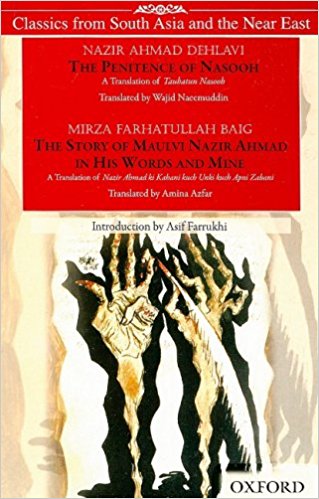Oxford University Press, Karachi, has put together a translation of two books (almost two books, since the second can perhaps qualify only as a booklet) which are related to each other in more ways than one. It is a welcome idea to get a fresh English translation of a seminal work of Urdu fiction, often acknowledged as the first Urdu novel, along with a biographical sketch of the pioneer Urdu writer himself by an illustrious student. I am talking about Maulvi Nazir Ahmad Dehlavi’s book Taubatun Nasooh (1874), first translated into English by Matthew Kempson and published in London (W.H. Allen & Co.) in 1884. The Kempson translation has been edited and published again from New Delhi in 2003 by C.M. Naim. The second book in the volume is Maulvi Nazir Ahmad Ki Kahani Kuchh Unki Kuchh Apni Zabani by Mirza Farhatullah Baig. The books have different translators, the Introductions too are by different writers. It is another matter that Shamim Hasnain, who has written the Introduction to The Story of Maulvi Nazir has not been mentioned on the cover of the volume, while Asif Farrukhi, whose Introduction to The Penitence of Nasooh is much more insightful and well argued, finds a prominent place.
The back flap/page carries a brief description of all contributors except Shamim Hasnain once again! Mysterious is the least I can say, since we are left clueless about this rather confused and self-contradictory Introduction writer who has described the Urdu language as ‘poverty stricken’ and going through a ‘period of bankruptcy’ the ‘stains’ of which can be ‘washed away’ by the act of translating Mirza Farhatullah Baig’s Story of Maulvi Nazir Ahmad simply because it abounds in idioms and witty humorous phrases! Paucity of space forces me to abandon this topic with just this comment that it is precisely the likes of Shamim Hasnain who are the real destroyers of any language, announcing that a crisis is prevailing where it certainly is not, and eagerly thereafter stepping into the shoes of ‘saviours’ of the language.

